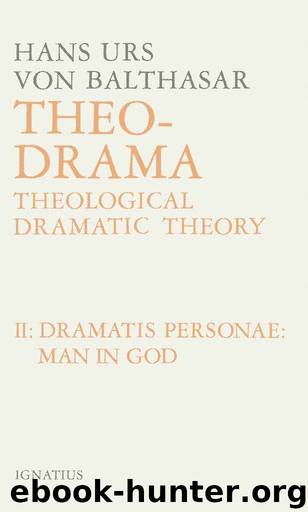Theo-Drama, Vol. 2: Dramatis Personae: Man in God by Hans Urs von Balthasar

Author:Hans Urs von Balthasar
Language: eng
Format: mobi
Tags: Spiritual & Religion
ISBN: 9780898702873
Publisher: Ignatius Press
Published: 1990-07-14T16:00:00+00:00
b. Facilitating Finite Freedom
On the basis of the foregoing, the question which philosophy feels to be the most difficult of all, namely, why and how there is relative, finite being beside Absolute being, should no longer be distorted into hopelessness. Two modes of approach have opened up: while the life of the Trinity must not under any circumstances be described as a “becoming” (since, despite the order of origin, Father, Son and Spirit are coeternal), the creaturely process of becoming can present an “image” of this primal life. Furthermore, as a result of the opposition of Persons in God, the “not” (“the Son is not the Father”, and so forth) possesses an infinitely positive sense; thus, too, “not holding on” to the divine nature but giving it away is part of the absolute positivity of the divine life (for the Spirit too gives himself away to the love of Father and Son—which he is): this being the case, the transition from infinite freedom to the creation of finite freedoms (with all this implies) need not constitute the “absolute paradox” of thought. Neither is there a paradox in saying, as we naturally do, that God does not need the world to confirm him as God or to provide him with a series of stages to go through and so perfect himself; indeed, he does not even need the world to reveal to himself the possibilities of his omnipotence: “Non quasi indigens Deus hominis” (Irenaeus, Adv. Haer. IV, 14, 1).
Certainly we must put a caesura between the eternal Yes uttered by God’s will to himself and his eternal life and the Yes which seals the decision to create. This is simply because the creation is not God and hence not necessary; not even in the sense in which Plato’s or Plotinus’ “Good” by nature overflows beyond itself or, in Leibniz, the idea of the best possible world “presses” to be brought into reality. The living God does not pour himself forth by nature; all the same, the freedom in which he determines that the world shall exist is, according to its nature, none other than the freedom by which he wills eternally to be what he is. The world, and finite freedom within it, will not have its ground in itself, like God, not even in an “idea”: its ground is exclusively in God’s freedom, which will always distinguish its nature from that of God, even at the highest level of union between divine and created freedom. But, being totally dependent on divine freedom, the world can receive its possibility and reality nowhere else but in the eternal Son, who eternally owes his divine being to the Father’s generosity. If the Son is the Father’s eternal Word, the world in its totality is created by this Word (Jn 1:3), not only instrumentally but in the sense that the Word is the world’s pattern and hence its goal. “Through him” also means “in him” and “for him” (Col 1:16). We must add immediately that the world’s location in the Son directly implies its location in the totality of the Godhead.
Download
This site does not store any files on its server. We only index and link to content provided by other sites. Please contact the content providers to delete copyright contents if any and email us, we'll remove relevant links or contents immediately.
The Lost Art of Listening by Michael P. Nichols(7506)
Why I Am Not A Calvinist by Dr. Peter S. Ruckman(4153)
The Rosicrucians by Christopher McIntosh(3521)
Wicca: a guide for the solitary practitioner by Scott Cunningham(3179)
Signature in the Cell: DNA and the Evidence for Intelligent Design by Stephen C. Meyer(3138)
Real Sex by Lauren F. Winner(3023)
The Holy Spirit by Billy Graham(2953)
To Light a Sacred Flame by Silver RavenWolf(2823)
The End of Faith by Sam Harris(2742)
The Gnostic Gospels by Pagels Elaine(2531)
Waking Up by Sam Harris(2461)
Nine Parts of Desire by Geraldine Brooks(2369)
Jesus by Paul Johnson(2363)
Devil, The by Almond Philip C(2333)
The God delusion by Richard Dawkins(2309)
Heavens on Earth by Michael Shermer(2285)
Kundalini by Gopi Krishna(2185)
Chosen by God by R. C. Sproul(2165)
The Nature of Consciousness by Rupert Spira(2108)
